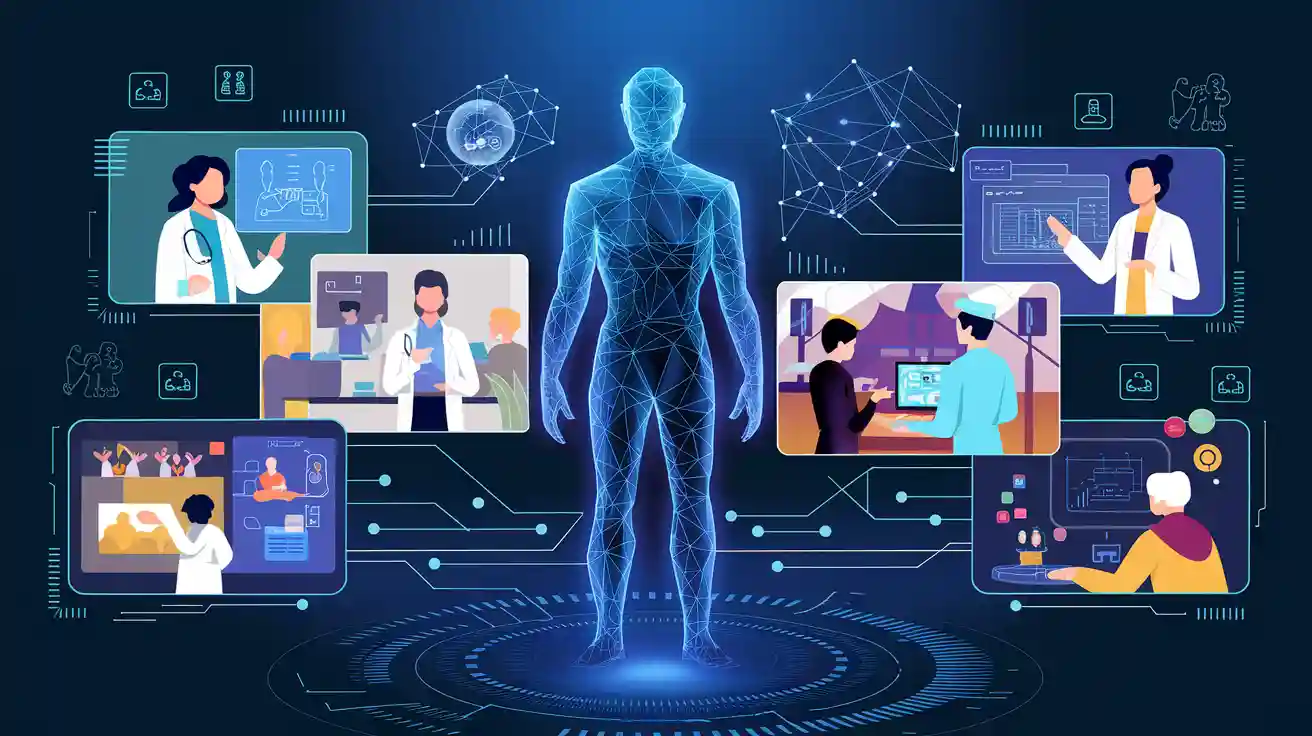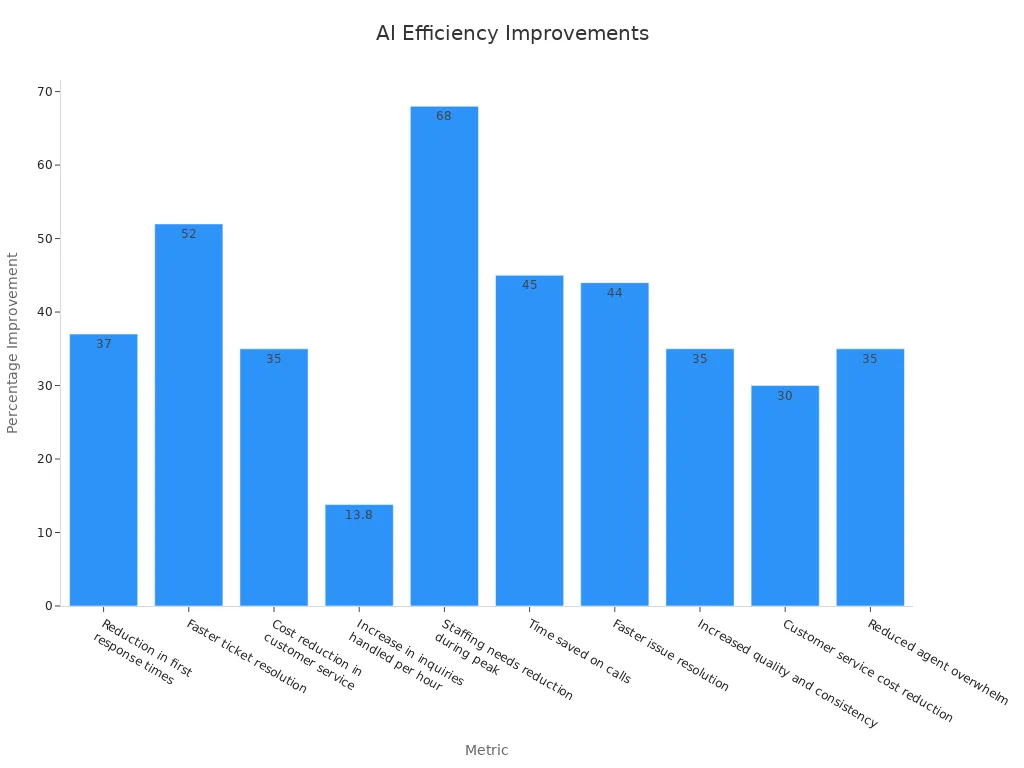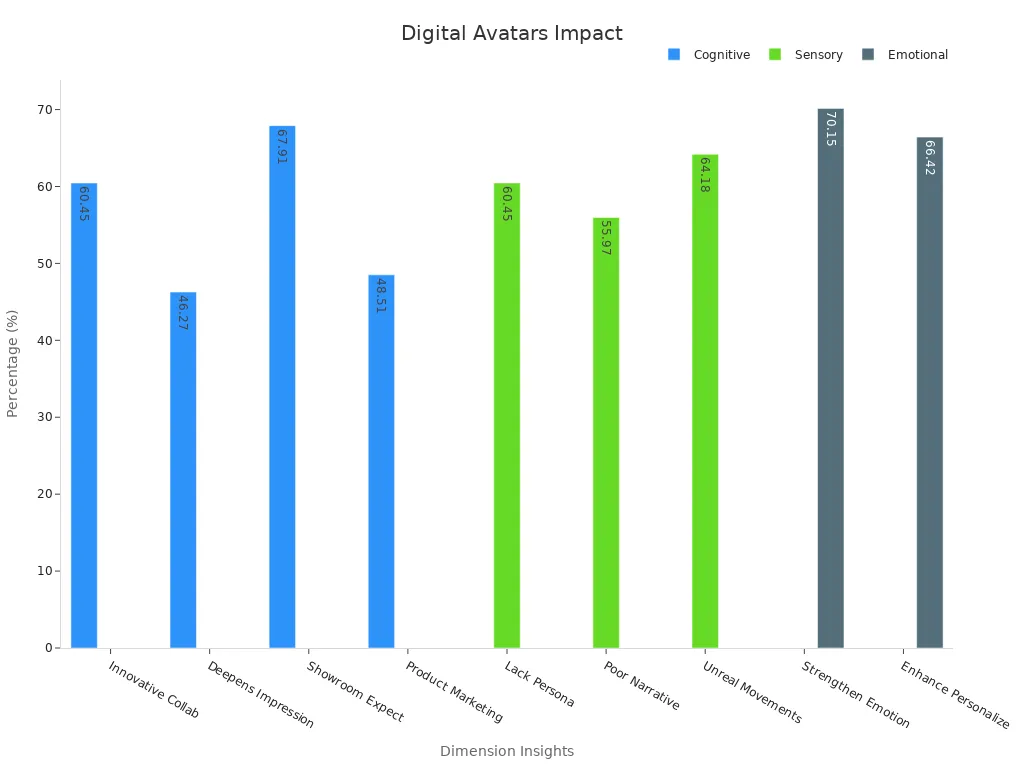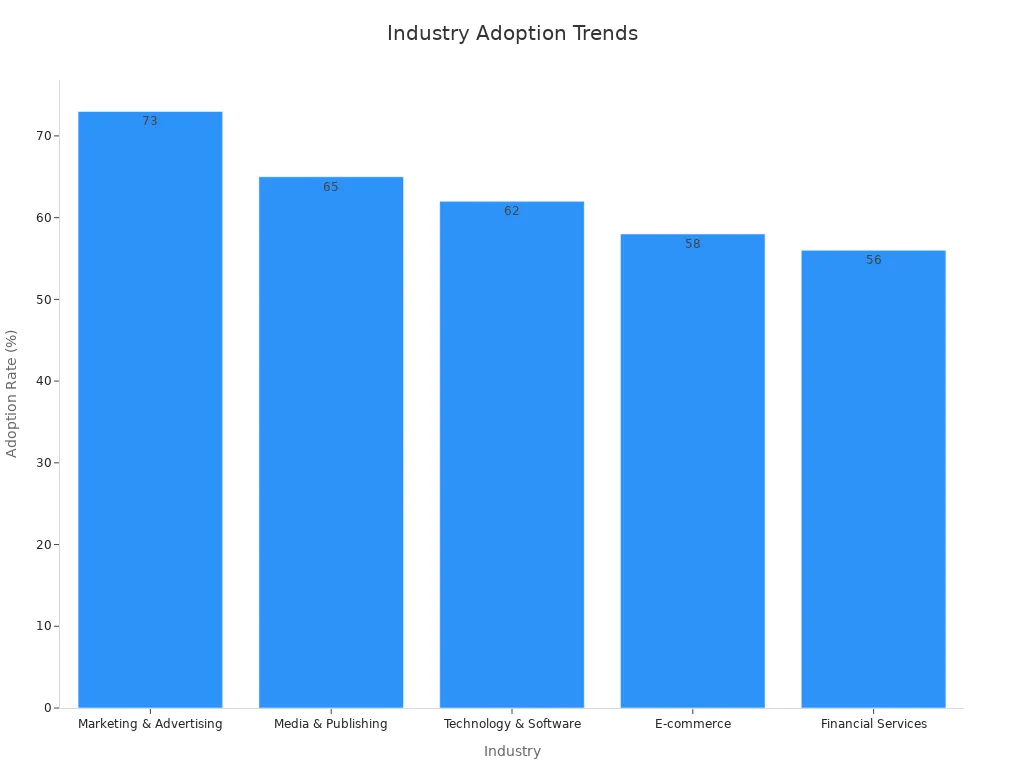
You see digital human technology everywhere in 2025. AI shapes how you connect with content, and you now trust artificial intelligence with daily decisions. As a human, you want innovation that feels personal. Digital human platforms deliver content that understands you. AI-driven content, powered by innovation, keeps transforming industries. Humans lead this change.
Key Takeaways
-
Digital humans powered by AI improve customer service, healthcare, education, media, and more by making interactions faster, more personal, and easier to access.
-
These virtual assistants save time and money for businesses while helping people get support anytime, boosting satisfaction and engagement.
-
While digital humans bring many benefits, it is important to stay aware of privacy and ethical concerns and use trusted platforms to protect your data.
Customer Service
Digital Human Agents
You probably notice that customer service feels different in 2025. When you reach out for help, you often talk to a digital human instead of a person. These virtual agents use artificial intelligence to answer your questions, solve problems, and even remember your preferences. In retail, banking, and e-commerce, digital human applications make every interaction feel personal. You get quick answers, and the agent never gets tired or frustrated.
Let’s look at some real-world cases. In banking, digital human agents guide you through opening an account or fixing a payment issue. In e-commerce, they help you track orders or suggest products. These applications boost efficiency and keep customers happy. In fact, 79% of customer service specialists say AI and chatbots are key to their strategy. About 75% of customer inquiries now get solved by chatbots without any human help. That means you spend less time waiting and more time getting things done.
CX leaders believe AI can streamline routine tasks, letting humans focus on creative and high-value work. But they also worry about keeping empathy and trust in service.
AI-Powered Support
AI-powered support takes customer service transformation to the next level. You see chatbots that understand your needs and respond instantly. These AI chatbots handle many cases at once, so you never feel ignored. Businesses report a 37% drop in first response times and a 52% faster ticket resolution thanks to these applications. Check out the chart below to see how AI improves service metrics:

AI chatbots also help companies save money and reduce stress for human workers. In real-world cases, organizations using AI-powered support saw a 35% reduction in service costs and a 13.8% increase in inquiries handled per hour. These applications show how digital human technology leads the way in customer service transformation.
Healthcare

Patient Engagement
You see healthcare changing fast in 2025. Digital human technology now helps you connect with your doctor and manage your health. AI-powered chatbots and virtual assistants talk to you in a way that feels natural. These applications answer your questions, remind you to take medicine, and help you schedule appointments. You get support that fits your needs, no matter where you are.
-
Digital human applications like telemedicine and mobile health apps boost patient engagement and keep your care on track, even during tough times like the COVID-19 pandemic.
-
Remote consultations and chronic disease management through digital platforms lead to better outcomes.
-
These tools make it easier for you and your provider to communicate, cut down on paperwork, and save time.
-
Many patients, including those with cancer, say user-friendly digital tools help them manage their conditions and feel more satisfied with their care.
You might notice that hybrid ai-powered chatbots combine artificial intelligence with human-like empathy. In Malaysia, Sunway Medical Centre used ai chatbots with diagnostic tools to automate routine tasks, letting doctors focus on complex cases. In Egypt, a medical chatbot helped with triage, scheduling, and follow-ups, making sure patients always had support.
Virtual Consultations
Virtual consultations have become a normal part of your healthcare journey. You can talk to your doctor from home using ai-driven platforms. These applications give you quick access to care and help you avoid long waits. A patient portal and mobile app from Ray Business Technologies let you check your health records, book appointments, and join telehealth visits. This approach makes your care more personal and convenient.
Tip: Trust and data quality matter. Always use secure platforms for your health information.
You see more people using ai in healthcare, but some face challenges. Not everyone has the same access to technology. Demographic and cultural barriers can affect who benefits most. Still, digital human solutions keep making healthcare more accessible and empathetic for everyone.
Education
AI Tutors
You see classrooms changing fast in 2025. AI tutors now help you learn in ways that feel personal and interactive. These digital human assistants use artificial intelligence to answer your questions, explain tough topics, and give you feedback right away. You don’t have to wait for a teacher to grade your work or answer your doubts. AI tutors spot where you struggle and adjust their teaching style just for you.
Check out how AI-powered applications compare to old-school teaching:
|
Metric |
AI-Enhanced Education |
Traditional Methods |
Study Details |
|---|---|---|---|
|
Student Engagement Increase |
Baseline traditional engagement |
Multi-country study across 24 nations, 1,800 classrooms (2020-2023) |
|
|
Learning Gains from Personalized AI Interventions |
28% higher learning gains |
Control groups without AI personalization |
Meta-analysis of 42 controlled studies, 50,000+ students in 16 countries |
|
Instructional Quality Improvement for Teachers |
41% higher instructional quality metrics with AI-assisted training |
Traditional professional development alone |
Longitudinal study of 3,200 teachers in 9 countries over 3 years |
These numbers show that AI tutors boost your engagement and help you learn more.
Personalized Learning
AI applications make learning fit you, not the other way around. You get lessons that match your pace and style. If you need extra practice, the system gives you more problems. If you master a topic, it moves you ahead. This approach keeps you interested and helps you reach your goals faster.
Tip: Personalized AI learning can help you stay motivated and finish your homework on time.
Teachers also use AI applications to track your progress and spot when you need help. They spend less time on grading and more time supporting you. Digital human technology makes education smarter and more fun for everyone.
Media and Entertainment
AI in Media and Entertainment
You see ai in media and entertainment everywhere in 2025. You watch movies, play games, and scroll through social feeds filled with ai-powered content. Media companies use ai to create new stories, edit videos, and even design music. You notice that ai use cases in media and entertainment now shape how you experience content. Studios use generative ai use cases to write scripts, animate scenes, and build virtual worlds. This technology brings dynamic storytelling to life, letting you interact with stories in real time.
Media platforms rely on ai to analyze what you like and suggest content that matches your interests. You get personalized recommendations, so you never run out of things to watch or play. Generative ai use cases help creators produce content faster and with more creativity. You see deepfakes and digital humans starring in movies and commercials, making you wonder what is real and what is ai-generated. Virtual performers and synthetic media now headline concerts and shows, giving you new ways to connect with your favorite characters.
Note: Research shows that combining immersive holographic communication with metaverse technology creates richer, more engaging media experiences. This approach lets you step inside stories and interact with digital human-like avatars, making media more personal and exciting.
Virtual Influencers
Virtual influencers have become stars in media. You follow digital humans who share stories, promote brands, and even host live events. These ai use cases in media and entertainment change how you connect with influencers. Brands use generative ai use cases to create virtual personalities that match their image. You see these digital humans in ads, music videos, and social media campaigns.
Media companies love the benefits of ai in media and entertainment. Virtual influencers never get tired, always stay on message, and can reach a global audience at any time. You notice that audience engagement rises when brands use ai-powered content. Virtual performers and synthetic media let you interact with influencers in real time, making you feel part of the story.
Dynamic storytelling powered by ai keeps you coming back for more. You see content that adapts to your choices, making every experience unique. Generative ai use cases let creators test new ideas and bring fresh innovation to media. You play games, watch shows, and join live streams where digital humans lead the action.
Media keeps changing fast. You see more ai use cases in media and entertainment every day. Content feels more personal, interactive, and fun. You become part of the story, not just a viewer. The benefits of ai in media and entertainment include better engagement, more creative content, and endless possibilities for innovation.
Metaverse

Immersive Experiences
You step into the metaverse and find yourself surrounded by digital humans who feel almost real. These avatars use ai to create worlds that react to your choices. You can shop, play games, or attend concerts, all from your living room. The metaverse brings ai in media and entertainment to life. You see virtual shopping assistants who help you pick out clothes or gadgets. H&M’s ai-powered chatbot, for example, gives you product tips and tracks your orders. This kind of ai in media and entertainment boosts your engagement and makes shopping fun.
Check out how companies use ai in media and entertainment to create immersive experiences:
|
Company |
Virtual Assistant |
Impact on Engagement and Sales |
|---|---|---|
|
Amazon |
Rufus |
Higher engagement during Prime Day |
|
Shopify |
Kit |
15% sales increase for small shops |
|
eBay |
ShopBot |
Faster support, more conversions |
You can join live events with friends from around the world. Ai in media and entertainment lets you interact with digital humans who host shows or guide you through virtual museums. These hyper-personalized experiences keep you coming back for more.
Personalized Interactions
In the metaverse, you get to shape your own story. Ai in media and entertainment powers digital humans who remember your preferences and adapt to your style. You might meet a virtual banker who helps you open an account or a digital mentor who guides you through onboarding. Banks now use ai to make onboarding faster and safer, with biometric checks and real-time support. Metro Commercial Bank saw onboarding time drop by 80% after using digital human-led platforms.
Tip: Personalization in the metaverse means every visit feels unique. Ai in media and entertainment makes sure you always feel seen and heard.
You notice that ai use cases in media and entertainment now blend with daily life. The metaverse gives you endless ways to connect, learn, and play, all powered by ai.
Retail
Virtual Shopping Assistants
You walk into an online store in 2025, and a digital human greets you by name. This virtual shopping assistant remembers your style, suggests outfits, and even helps you find gifts for friends. You get answers right away, and the assistant never gets tired or impatient. These digital humans guide you through product selections, making shopping feel easy and fun.
Retailers use AI to create personalized shopping experiences. You see recommendations that match your taste and budget. The assistant can show you how a jacket looks in different colors or help you compare tech gadgets. You feel like you have a personal shopper, even when you browse from your couch.
Tip: Virtual shopping assistants can save you time and help you discover new products you might love.
Audience Engagement
Digital humans do more than just help you shop—they boost audience engagement and drive sales. Brands use virtual ambassadors to connect with you across social media, websites, and even live streams. You notice that these digital humans remember your preferences and chat with you about your favorite products.
Check out how consumers respond to digital brand ambassadors:
|
Dimension |
Key Insights |
What It Means for Retail |
|---|---|---|
|
Cognitive |
Shoppers want digital guides in stores |
|
|
Sensory |
64.18% want more realistic expressions |
Realism boosts trust and connection |
|
Emotional |
66.42% want personalized experiences |
Personalization keeps shoppers loyal |
|
Behavioral |
Positive effects on sharing and buying |
Digital humans drive sales and reviews |

You see real results. Nespresso’s digital ambassador campaign led to a 22% global sales jump. In the UK, sales rose by 35%. These digital humans help brands reach a wider audience and keep shoppers coming back. You get a shopping experience that feels personal, interactive, and fun.
Financial Services
Onboarding
You open a new bank account in 2025, and the process feels fast and easy. Digital humans greet you, guide you through each step, and answer your questions. These ai-powered chatbots check your identity, collect your documents, and help you sign up in minutes. You no longer wait in line or fill out endless forms. Service speed improves, and you feel more confident with real-time support.
Banks use ai to spot fraud during onboarding. Chatbots scan your information and flag anything suspicious. This keeps your money safe and builds trust. You see ai applications in every part of the process, from verifying your ID to setting up your online banking. The whole experience feels smooth and secure.
Tip: Always use secure platforms for your financial data. Digital humans make onboarding simple, but your privacy matters.
AI Advisors
You want advice about saving or investing. Digital human advisors powered by ai give you answers right away. These chatbots look at your spending, suggest ways to save, and even help you plan for the future. You get advice that fits your needs, not just generic tips.
Check out how ai transforms financial service workflows:
|
Aspect |
Details |
|---|---|
|
Challenge |
T-Mobile faced slow app development cycles due to reliance on IT and lack of technical resources among employees, causing inefficiencies and delayed projects. |
|
Solution |
Deployment of Power Platform Copilot enabled non-technical employees to build apps and automate workflows using AI-assisted low-code tools, reducing IT bottlenecks. |
|
Results & Impact |
Accelerated delivery of custom solutions, increased productivity, reduced IT workload, improved employee satisfaction, and faster response to market changes. |
You see more companies using ai chatbots to handle routine service tasks. Here’s what’s happening:
-
Palo Alto Networks uses ai assistants to manage employee requests with little human help.
-
Jamf’s ai chatbots in Slack help employees get instant support, cutting down on helpdesk calls.
-
Bud Financial’s ai chatbots move money to avoid overdrafts, keeping your finances healthy.
These ai applications make financial service faster, more accurate, and more personal. You get help when you need it, and your experience feels tailored just for you.
Marketing Automation
Brand Ambassadors
You see digital humans everywhere in 2025. They serve as interactive brand ambassadors, bringing your favorite brands to life. These digital humans use ai to create content that feels personal and real. You might chat with a digital ambassador on social media, see them in a video, or even get a product tip during a live stream. They remember your preferences and adapt their storytelling to match your interests. This approach boosts audience engagement and keeps you coming back for more.
Brands love using digital humans because they work across every media channel. You get a seamless experience whether you scroll through your feed, watch a video, or visit a website. Generative ai use cases help these ambassadors create fresh content fast. They can answer questions, share stories, and even react to trends in real time. This level of innovation makes marketing feel less like an ad and more like a conversation.
Note: Research shows that digital human solutions can cut costs, improve decision-making, and streamline workflows. But you also face challenges, like learning new skills and keeping up with rapid changes.
Dynamic Messaging
Dynamic messaging powered by ai changes how you see content. Digital humans use generative ai use cases to craft messages that fit your mood, location, and even the time of day. You notice that storytelling feels more interactive. The content you see adapts to your choices, making every interaction unique.
Check out this chart showing how different industries use ai and digital humans for content and media:

You see marketing teams using ai to speed up content creation and improve engagement. Hybrid models, where humans and ai work together, lead to higher productivity and better results. Generative ai use cases in media and marketing help brands tell stories that connect with you on a deeper level.
Still, you need to think about privacy and ethics. Real-time data collection and personalized content raise questions about how your information gets used. Companies must balance innovation with trust to keep your data safe.
Workplace
AI Assistants
You walk into your office and see digital humans ready to help. These AI assistants greet you, answer your questions, and help you with daily tasks. You might ask them to schedule meetings, send reminders, or find important files. They use ai to understand your needs and give you quick answers. You save time because you do not have to search for information or wait for help.
Many companies use ai assistants to train new employees. You can ask questions about company policies or get help with software. These digital humans never get tired, so you always have support. In some offices, ai assistants even help with onboarding, making sure you finish all your tasks on time.
Tip: Try asking your ai assistant for shortcuts or tips. You might find new ways to work faster.
Workflow Automation
You notice that ai now handles many routine jobs. Digital humans use ai to automate tasks like data entry, report generation, and scheduling. You do not have to worry about small mistakes because ai checks everything for you. This makes your work more accurate and less stressful.
Here are some ways ai improves your workflow:
-
Automates meeting notes and sends summaries.
-
Tracks project progress and alerts you to deadlines.
-
Sorts emails and flags important messages.
Companies like Deloitte and IBM use ai to manage large projects. Their teams finish work faster and make fewer errors. You see that ai-powered workflow automation lets you focus on creative and important work.
Elderly Care
Companionship
You might feel lonely sometimes, especially as you get older. Digital humans can help you feel less alone. These friendly virtual companions chat with you, remember your favorite stories, and even play games. You can talk to them about your day or ask for advice. Many seniors say these digital friends make them smile and feel more connected.
Note: Studies show that regular conversations with a digital human can lower feelings of isolation and boost your mood.
You do not have to worry about being judged or misunderstood. The digital human listens to you and responds with empathy. This support helps you stay positive and enjoy each day.
Daily Assistance
You want to stay independent as long as possible. Digital humans can help you with daily tasks. They remind you to take your medicine, help you schedule doctor visits, and even guide you through exercises. You can ask for help with recipes or get reminders for important events.
Here’s a quick look at how digital humans support your daily life:
|
Task |
How Digital Humans Help |
|---|---|
|
Medication |
Reminders and tracking |
|
Appointments |
Scheduling and alerts |
|
Exercise |
Guided routines and tips |
|
Social Connection |
Video calls and messages |
You feel more confident and safe at home. Digital humans give you the support you need while letting you make your own choices. This technology helps you live life on your terms.
Benefits and Challenges
Efficiency
You see how digital humans make your life easier. With ai, you get answers fast and never have to wait in long lines. These smart systems handle many tasks at once. You can ask questions, get reminders, or solve problems in seconds. Companies use ai to save money and help workers focus on bigger projects. You notice that ai keeps things running smoothly, even when things get busy.
Here are some ways ai boosts efficiency:
-
Handles customer questions 24/7
-
Automates boring tasks like data entry
-
Speeds up onboarding and training
-
Reduces mistakes with smart checks
You also enjoy more engagement. Digital humans remember your choices and make every chat feel personal. Some platforms use personalization to suggest products or content you might like.
Ethical Concerns
You might wonder if ai always makes the right choices. Sometimes, these systems use your data to learn about you. Privacy becomes a big concern. You want to know how your information gets used. Some people worry that ai could replace jobs or make mistakes that hurt real people.
Note: Always check if a company uses safe and fair ai practices. Ask questions about how your data stays private.
Here’s a quick look at the main challenges:
|
Challenge |
Why It Matters |
|---|---|
|
Privacy |
Protects your personal info |
|
Bias |
Keeps ai fair for everyone |
|
Job Disruption |
Helps workers stay valuable |
|
Trust |
Builds confidence in ai systems |
You play a key role in shaping how ai grows. Stay curious and ask for clear answers about how these tools work.
You see digital humans changing your world in 2025. These solutions help you work smarter, connect faster, and feel more understood. Every industry now relies on human-like technology. You face new challenges, but you also find more ways to grow. Stay curious as the human experience keeps evolving with digital humans.
FAQ
What is a digital human?
A digital human is an AI-powered virtual person. You interact with them online. They can talk, answer questions, and help you with tasks.
How do digital humans protect my privacy?
Digital humans use secure systems. You control your data. Always check privacy settings before you share personal information.
Can digital humans replace real people?
You still need real people for complex or emotional tasks. Digital humans help with routine jobs, but they work best alongside humans.
